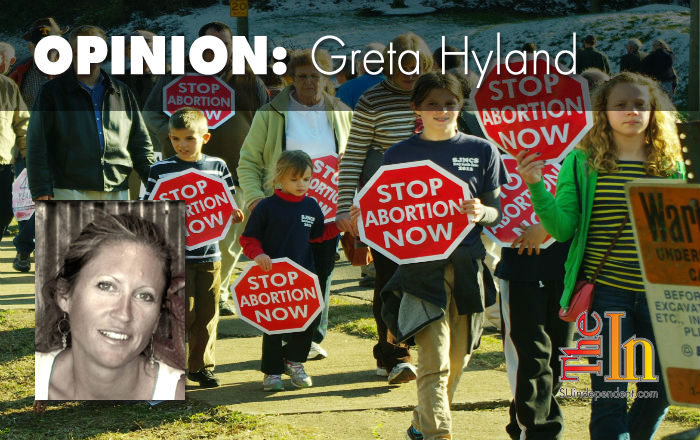OPINION: Roe v. Wade and the dark side of the pro-life movement
 Written by Greta Hyland
Written by Greta HylandI believe that if anti-abortionists put half the amount of energy into those outside of the womb as they expend for those within, the outcome would be far more beneficial and fruitful for society.
There is a dark side to the pro-life movement. It is a blindness that comes with looking at abortion through a narrow moral view. The debate over abortion is often overly simplified down to a debate over life or choice. It is hard to argue against either one of those things as everyone believes in a right to life and a right to free agency. But the debate over abortion is so much more complicated than that. And while there are holes in both sides of the argument, I want to address the gaping holes in the pro-life argument.
While attending what was Dixie State Community College in 1999, I took an English novels class. One of the books we read was Mary Shelley’s “Frankenstein.” That book had a profound impact on me as it made me think of abortion and the dark side of giving birth to a life you don’t want. In the book, the creation asks the creator why he created him. He had no choice in being created after all.
If you are unfamiliar with the story, Dr. Frankenstein created the monster and then hated him and left him to fend for himself in a cruel and harsh world; to which the monster responded to not only his creator, but to the world, in agony, pain, and anger.
I’m sure you know where I am going with this. There are often memes that go around Facebook stating that just because you can have children doesn’t mean you should. Since no one is going to stop having sex, contraception is the best option to avoid an unwanted pregnancy, but even that sometimes isn’t enough.
When thinking about the birth of a baby, many think of a cute nursery, a babbling baby, and a cooing mother. What many don’t think about is pedophiles, drug addicts, or poverty. And while many believe that abortion is largely a black or minority problem, white woman have just as many abortions as any other race, as unwanted pregnancy is universal across the board.
In the wake of the anniversary of Roe v. Wade, and with states taking abortion into their own hands and putting extreme limitations on it, one cannot escape thinking about it. Though abortion is legal in this country and has been for a long time, it is still as controversial now as it was when it was legalized. But why? Because it’s a moral issue? It used to be illegal for blacks and whites to marry, and was also considered immoral, but it’s largely accepted today.
The early Christian Church went through a seismic shift when Constantine became a Christian. At that time “the Church” started shifting from the redemption of souls to playing with power. Augustine suggested that “compulsion was righteously used when it was informed and motivated by a spirit of charity; to neglect those souls who had strayed from correct belief was a greater cruelty than punishment, because it forever condemned them to darkness.”
Based on that, the church crossed over into civil matters and started using its power to enforce God’s will outside of the church. Instead of God’s grace, people got religion’s iron fist. What modern day pro-life people are doing today is virtually the same. While I do believe there is a moral argument to be made against abortion, I believe there is also a moral argument to be made for it. Of course there are also societal and economic arguments to be made as well.
If we are talking about people who need real charity, is it not the ones walking around in front of us that we should be caring for? Furthermore, with the evil in the world perpetrated by people against children, are the ones born into such situations better off?
I can’t help thinking that a child born to a mother and father who do not want it is doomed to a life of tragedy; especially if the parents are criminals, opportunists looking to make money off of the child whether by selling them into prostitution or just abusing them, or who give birth to them while addicted to drugs and subsequently pass that addiction on, as well as a host of other undesirable situations. There are far too many horror stories of what happens to children to believe that abortion is the worst of those offenses and worthy of such vitriol in a country that has legalized it.
Furthermore, giving birth and raising children is expensive. Sixty-nine percent of women who have abortions are economically disadvantaged. Many poor women can barely afford to take care of themselves, let alone a child. And when it is men who push an anti-abortion agenda, when men are largely unaccountable for the children they conceive, this battle against women and children is unconscionable.
If you connect the dots from a poor girl or woman who gets pregnant to the policy makers making the decisions about whether or not she can abort a baby, and then also controls if she can get federal aid or healthcare, the intelligent mind must grapple with where the larger sin lies. While this is not a gender debate, it doesn’t take much to see that where doors are closed for women, the same are not closed for men.
When you couple a moral agenda with policy, that is as multifaceted in civil society as raising a child, you can see why women are at such a disadvantage. They get hit with moral condemnation, they get hit with added economic hardship, they get hit with class warfare from people who surely have never made a bad decision, and they are often left alone as a single parent to do it all. Yes, a woman has a choice – but so does a man, and so does society.
The effects of having children are born by society as well as the parent. Believe it or not, 73 percent of people who have abortions report a religious affiliation. I can’t help wondering how many of those were people trying to hide the public display that they had sex outside of marriage. The battle being waged by religion against abortion comes across as persecution rather than love, and is beginning to look like a moral vendetta based on misguided religious rights and power.
The more charitable thing to do in my mind is to take care of the children who are alive and suffering outside of the womb, make contraception widely available, make sure women have healthcare, and teach men to be accountable and responsible for the children they conceive as well. Then maybe our country won’t continue to fight over the subject of birth and will start to help people rather than create desperate and possibly worse situations for them.
We must start looking at all of the components of life that come into play when deciding to force people to have children or condemning those who choose not to. Creating a scenario where a woman faces a dead end street with regard to her body, her choices, and making it in this world seems rather like cruel and unusual punishment for something that is legal, albeit morally wrong to some.
Greta Hyland has a Masters degree in Environmental Policy & Management and has worked for the BLM and the NPS as well as for non-profit organizations. She is a regular contributor to the Utah Adventure Journal and is the Copy Editor at the Independent. She writes regularly on her blog about environmental policy issues affecting the southwest, as well as personal narratives about outdoor recreation and simple living. Her blog can be found at www.thesouthwestjournal.wordpress.com A Utah native, Greta is a consummate desert rat and loves exploring the southwest. She can be reached at [email protected]




